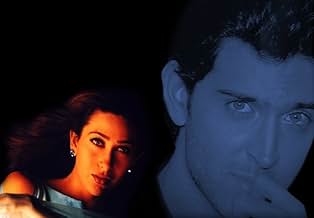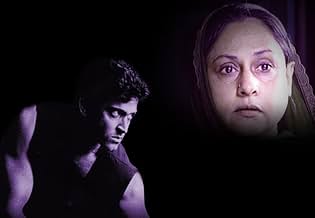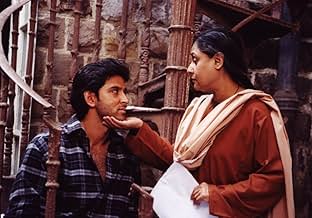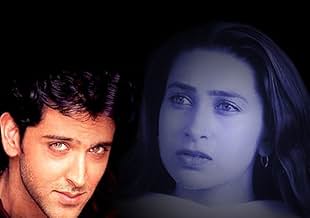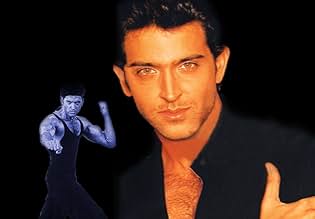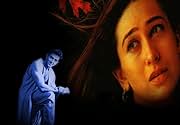VALUTAZIONE IMDb
6,0/10
4646
LA TUA VALUTAZIONE
Aggiungi una trama nella tua linguaIn 1993 Fiza's brother Aman disappears during the riots in Mumbai. In 1999 Fiza is tired of waiting and goes looking for him.In 1993 Fiza's brother Aman disappears during the riots in Mumbai. In 1999 Fiza is tired of waiting and goes looking for him.In 1993 Fiza's brother Aman disappears during the riots in Mumbai. In 1999 Fiza is tired of waiting and goes looking for him.
- Regia
- Sceneggiatura
- Star
- Premi
- 12 vittorie e 25 candidature totali
Shabana Raza
- Shenaz
- (as Neha)
Johny Lever
- Laughing Club Comic
- (as Jhonny Lever)
Shivaji Satam
- Mr. Sawant
- (as Shivaaji Satam)
Manoj Bajpayee
- Murad Khan (Guest Appearance)
- (as Manoj Bajpai)
Recensioni in evidenza
10vlulla
Fiza is definitely one of the better movies churned out by Bollywood in recent times. It carries a message that every religion is good but it is the politicians who are using religion as a weapon and destroying innocent families for ulterior motives. It deals with the problems being faced in India currently which have been repeatedly erupting and causing a huge dent in the economy. Since the past 50 years, every time India has got back on its feet a new politician created calamity has dragged it back down preventing it from being a power to reckon with and doing away with national problems like poverty and illiteracy which prevents people from leading a normal existence. And every time the roots of these calamities can be traced to religion. Everything is not fair in the name of religion. The film has good music and both Karisma & Hrithik have rendered superb award winning performances. Some people may feel that Hrithik's character is not very strong but looking at it from a perspective of what he is subjected to and circumstances which he cannot control make him the person portrayed in the movie. The silent scene of him in the train says it all.
A powerful movie with superb acting from all the actors and actresses. Beautifully choreographed music. This movie was the best movie I've seen this year. Hrithik Roshan is a brilliant actor as the role he played was very demanding.Karisma Kapoor was also outstanding and the special appearance by Sushmita Sen was in a class of its own ! Go and watch the movie with an open mind. You will not be dissappointed!
Having not really watched Bollywood films, since the days of the action movies of the 70's & 80's, I wasn't really interested in watching the more recent offerings from Bollywood, since I assumed they were mostly love stories and were full of songs which had no reason for being there.
But, having watched a few (subtitled) films shown as part of an Indian season over here in the UK, I've started to change my mind.
I watched Fiza last night and even though it was full of songs and was let down slightly by the second half, I was amazed to find a film dealing with the Bombay Hindu/Muslim riots of 1993 and it's consequences on a Muslim family.
It starts with the 1993. Amaan (Hrithik Roshan) lives with his mother (Jaya Bachchan) and sister Fiza (Karishma Kapoor). One night Amaan goes out into the riot-stricken streets of Bombay and disappears. We then jump to 1999 and the first half of the film then deals with the consequences, as Fiza determines to find her brother.
Through flashback we find out what happened, as Amaan finds himself a outsider in his own country, but the real reasons for his disappearance are only discovered when Fiza discovers her brother hiding out with terrorists.
I won't reveal the rest of the story, but I will say, it was refreshing to see a film from the Indian-Muslim viewpoint and having central characters who were Muslim. Being British and of Indian-Hindu descent, I hadn't really thought about it before.
I know the film isn't an in-depth look at the problem or even that it represents Indian-Muslims in general, but it did open my eyes slightly to the problems facing India today, especially since the recent (2002) Hindu/Muslim riots in Gujarat showed how bad the violence could be and how much politics played it's part in them.
One last point, the performances from the three main leads is excellent. Hrithik Roshan was much better than I expected, but Jaya Bachchan and Karishma Kapoor were really outstanding.
Although, not a perfect film and still very Bollywood in it's style, I still found it much better then the standard Bollywood fare and I would highly recommend it.
But, having watched a few (subtitled) films shown as part of an Indian season over here in the UK, I've started to change my mind.
I watched Fiza last night and even though it was full of songs and was let down slightly by the second half, I was amazed to find a film dealing with the Bombay Hindu/Muslim riots of 1993 and it's consequences on a Muslim family.
It starts with the 1993. Amaan (Hrithik Roshan) lives with his mother (Jaya Bachchan) and sister Fiza (Karishma Kapoor). One night Amaan goes out into the riot-stricken streets of Bombay and disappears. We then jump to 1999 and the first half of the film then deals with the consequences, as Fiza determines to find her brother.
Through flashback we find out what happened, as Amaan finds himself a outsider in his own country, but the real reasons for his disappearance are only discovered when Fiza discovers her brother hiding out with terrorists.
I won't reveal the rest of the story, but I will say, it was refreshing to see a film from the Indian-Muslim viewpoint and having central characters who were Muslim. Being British and of Indian-Hindu descent, I hadn't really thought about it before.
I know the film isn't an in-depth look at the problem or even that it represents Indian-Muslims in general, but it did open my eyes slightly to the problems facing India today, especially since the recent (2002) Hindu/Muslim riots in Gujarat showed how bad the violence could be and how much politics played it's part in them.
One last point, the performances from the three main leads is excellent. Hrithik Roshan was much better than I expected, but Jaya Bachchan and Karishma Kapoor were really outstanding.
Although, not a perfect film and still very Bollywood in it's style, I still found it much better then the standard Bollywood fare and I would highly recommend it.
First time director Khalid Mohammed, who is a respected film critic, dons on a new cap and displays to Indian cinema what can be achieved visually in a film, and how a plot can take its audience to high expectations. This newly developed plot, with characteristics and representations that is very much three dimensional and anti-stereotype, commends the director for his skills as a film-maker.
Its very rare to find an woman, displayed on the moving canvas, as independent, strong and intelligent. Films like Mother India (1965), Bandit Queen (1996), Roja (1993), Hazzar Churasi Ki Maa (1998) and The Terrorist (1998/1999) are examples and the movie Fiza (2000) joins such list. Here the main character called Fiza, played wonderfully by Karishma Kapoor, is seen as such. Fiza is a woman presented in a material world that profits from politics and religion, a male dominated environment. Fiza, which means seasons, goes out in a dangerous world to find her brother, who is in contrast to Fiza as we soon learn.
Amman, played convincingly by the talented Hrithik Roshan, is seen as rather weak willed, easy to command over and psychologically unbalanced while finding his own identity. Even though he is built as a strong man through his physicality, his inner strength is weak and Fiza knows this. This forms part of the reason for his search when she leans that he is has associated with a terrorist group and the justification for this is rather strong. It also shows that man is not as perfect as they think to be and really brings out a new representation of them in this Indian film.
The characteristic of the mother, played by the wonderful theatrical actor Jaya Bachchan, is also similar to Fiza which has been fully developed making audiences emotionally bonded with her. This is due to her growing up in the times of post independence when women were considered to be below the male species in India. Living throughout two generations she carries both ideologies of the past and present seen through her own eyes. While respecting her religion very thoroughly, she is seen to be very close to her children and loves them dearly. This adds another reason why Fiza needs to find her brother, to make sure that her mother remains strong like her and that her believes that her son is still alive is true.
Yet when she sees the real colors of her son, she is dismayed and admits defeat. Sadly she commits suicide as a result. Many audience found this to be rather 'Indian cinema'. Yet to me it makes sense why the director took this path. She is a product of the past, and of faith. When she realizes that her faith of bringing Amman had failed in her eyes, she cannot face herself and as a result dies. If Fiza had a son, like Amman and the same circumstances happened in the future then Fiza would be able to cope with this as society is much more open then it was when Nishatbi was growing up. Clearly the director has thought-out the characters past, present and future rather wonderfully and intelligent audience who capture this understand engage in the film more deeply then what the film offers us on the surface.
There are moments when the film does play on stereotypes with the ministers, leaders, hit men and media, and this could have been improved upon. Yet these Indian cinema conventions manage to work within this screenplay as it is very brief and never dwelled upon. Other minor disappointments with the movie is the way songs come into the narrative structure making this film seem more apt-able for commercial cinema audiences. Dances, glamor and overly high modern songs seen in this film don't agree with the overall narrative jarring the viewing senses and prolonging time. The song only applicable for the film would be 'Piya Haji Ali', beautifully composed by A.R. Rahman, and the song 'Mere Watan' composed by Ranjit Barot as they help with the film's screenplay.
Now that I have talked about the content of the film lets ponder over the technical values, all of which are breathtaking. Cinematography by Santosh Sivan is excellent throughout capturing the images and light effects with perfection, while art design work is also very realistic and helps with the overall look of the film. Editing is also rather good and manages to blend the scenes rather well never deviating from the core matter, just wish those useless songs were edited out.
The film is an interesting concept from the new director and displays that his future work will be something all audiences will view with high expectations. But the director must move away from the 20 year old conventions we have seen in all of Indian films, in order to achieve something properly intellectual. Still Fiza is a good movie with brilliant characters, acting and technical credits.
Its very rare to find an woman, displayed on the moving canvas, as independent, strong and intelligent. Films like Mother India (1965), Bandit Queen (1996), Roja (1993), Hazzar Churasi Ki Maa (1998) and The Terrorist (1998/1999) are examples and the movie Fiza (2000) joins such list. Here the main character called Fiza, played wonderfully by Karishma Kapoor, is seen as such. Fiza is a woman presented in a material world that profits from politics and religion, a male dominated environment. Fiza, which means seasons, goes out in a dangerous world to find her brother, who is in contrast to Fiza as we soon learn.
Amman, played convincingly by the talented Hrithik Roshan, is seen as rather weak willed, easy to command over and psychologically unbalanced while finding his own identity. Even though he is built as a strong man through his physicality, his inner strength is weak and Fiza knows this. This forms part of the reason for his search when she leans that he is has associated with a terrorist group and the justification for this is rather strong. It also shows that man is not as perfect as they think to be and really brings out a new representation of them in this Indian film.
The characteristic of the mother, played by the wonderful theatrical actor Jaya Bachchan, is also similar to Fiza which has been fully developed making audiences emotionally bonded with her. This is due to her growing up in the times of post independence when women were considered to be below the male species in India. Living throughout two generations she carries both ideologies of the past and present seen through her own eyes. While respecting her religion very thoroughly, she is seen to be very close to her children and loves them dearly. This adds another reason why Fiza needs to find her brother, to make sure that her mother remains strong like her and that her believes that her son is still alive is true.
Yet when she sees the real colors of her son, she is dismayed and admits defeat. Sadly she commits suicide as a result. Many audience found this to be rather 'Indian cinema'. Yet to me it makes sense why the director took this path. She is a product of the past, and of faith. When she realizes that her faith of bringing Amman had failed in her eyes, she cannot face herself and as a result dies. If Fiza had a son, like Amman and the same circumstances happened in the future then Fiza would be able to cope with this as society is much more open then it was when Nishatbi was growing up. Clearly the director has thought-out the characters past, present and future rather wonderfully and intelligent audience who capture this understand engage in the film more deeply then what the film offers us on the surface.
There are moments when the film does play on stereotypes with the ministers, leaders, hit men and media, and this could have been improved upon. Yet these Indian cinema conventions manage to work within this screenplay as it is very brief and never dwelled upon. Other minor disappointments with the movie is the way songs come into the narrative structure making this film seem more apt-able for commercial cinema audiences. Dances, glamor and overly high modern songs seen in this film don't agree with the overall narrative jarring the viewing senses and prolonging time. The song only applicable for the film would be 'Piya Haji Ali', beautifully composed by A.R. Rahman, and the song 'Mere Watan' composed by Ranjit Barot as they help with the film's screenplay.
Now that I have talked about the content of the film lets ponder over the technical values, all of which are breathtaking. Cinematography by Santosh Sivan is excellent throughout capturing the images and light effects with perfection, while art design work is also very realistic and helps with the overall look of the film. Editing is also rather good and manages to blend the scenes rather well never deviating from the core matter, just wish those useless songs were edited out.
The film is an interesting concept from the new director and displays that his future work will be something all audiences will view with high expectations. But the director must move away from the 20 year old conventions we have seen in all of Indian films, in order to achieve something properly intellectual. Still Fiza is a good movie with brilliant characters, acting and technical credits.
My husband and I really enjoyed this movie. The music is great, and the story was really really good. I think this was a great way to introduce us to Hindi movies since the story was so compelling and included a look at Hindu/Muslim relations that Americans don't really know or understand. Plus the cinematography was beautiful. After seeing this one, we hardly watch any english language movies anymore! Go Bollywood!
Lo sapevi?
- QuizThe film was set to be a artistic film. But Khalid Mohammed decided to commercialize the film due to pressure from the distributors. Karishma Kapoor had a dance number added. Johnny Lever park scene was added. More songs were added. Hrithik's role increased including his work out and more songs.
- BlooperThe dead mother shows eye movement in her first shot as a body.
- ConnessioniReferenced in SRF DOK: Bollywood im Alpenrausch (2000)
- Colonne sonoreAaja Mahiya
Written by Gulzar (as Sampooran Singh Gulzar)
Composed by Anu Malik
Performed by Udit Narayan and Alka Yagnik
Courtesy of Tips Cassettes & Records Co.
I più visti
Accedi per valutare e creare un elenco di titoli salvati per ottenere consigli personalizzati
- How long is Fiza?Powered by Alexa
Dettagli
- Data di uscita
- Paese di origine
- Sito ufficiale
- Lingue
- Celebre anche come
- В поисках брата
- Luoghi delle riprese
- Aziende produttrici
- Vedi altri crediti dell’azienda su IMDbPro
Botteghino
- Budget
- 1.000.000 USD (previsto)
- Lordo Stati Uniti e Canada
- 596.591 USD
- Fine settimana di apertura Stati Uniti e Canada
- 374.708 USD
- 10 set 2000
- Lordo in tutto il mondo
- 596.591 USD
- Tempo di esecuzione2 ore 50 minuti
- Colore
- Mix di suoni
- Proporzioni
- 2.35 : 1
Contribuisci a questa pagina
Suggerisci una modifica o aggiungi i contenuti mancanti





